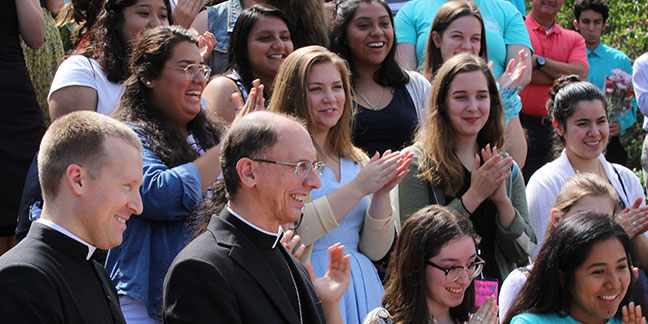CHARLOTTE — Three Diocese of Charlotte leaders who help teach local Catholics about “Humanae Vitae” reflect on the 50th anniversary of the encyclical and share their perspectives on putting its teachings into practice in their own lives:
Jessica Grabowski is a married mother of three and the diocese’s Respect Life program director.
 Humanae Vitae is a profound document which foretold many intricacies of the future of the family – which is the culture as we see it today – in a truly prophetic way. I had the privilege to study this and other papal documents in moral theology classes at The Catholic University of America (my alma mater).
Humanae Vitae is a profound document which foretold many intricacies of the future of the family – which is the culture as we see it today – in a truly prophetic way. I had the privilege to study this and other papal documents in moral theology classes at The Catholic University of America (my alma mater).
In one particular class, Christian Marriage and Family Life, which I unknowingly took with my future spouse (and taught by my future father-in-law), I had the opportunity to study “Humanae Vitae” and the detrimental impacts birth control has had on families and marriages throughout the last five decades.
Despite the warning signs provided in this document, I realized how far the good of the family had fallen because of the Pill. By focusing on the beauty of what marriage and family ought to be when husband and wife fully give themselves to God, one another and their families, we as a family try to emulate all that marriage and family should be according to His divine will. We truly believe that leading through example and prayer in our family life is the most powerful way to help bring the sanctity of marriage and family back into our culture.
Families and marriages need support and enrichment to stay strong, especially with the state of our current society. So we look to the example of other strong marriages and families and try to provide that same example by prayerfully following God’s will in our family.
Batrice Adcock is a married mother of three and the diocese’s Natural Family Planning director.
 When I think about my own experience with Natural Family Planning, by God’s grace my husband and I were introduced to a priest right here from our own diocese when we were discerning marriage. He really explained to us the beauty of the Church’s teaching on marriage and sexuality and family planning, so that when we got married we were able to embrace Natural Family Planning.
When I think about my own experience with Natural Family Planning, by God’s grace my husband and I were introduced to a priest right here from our own diocese when we were discerning marriage. He really explained to us the beauty of the Church’s teaching on marriage and sexuality and family planning, so that when we got married we were able to embrace Natural Family Planning.
It has been very helpful for us throughout our almost 15 years of marriage, for avoiding pregnancy when we needed to, for achieving pregnancy quickly when we tried and for helping me overcome problems with my health that were causing miscarriage.
So we are really thankful for what Natural Family Planning has provided for us.
It totally changed my career path. Pope Paul VI even mentioned this in “Humanae Vitae,” saying that often couples, through their own experience, would be inspired to share this with others.
Ultimately, that is what has happened with me. I am very thankful to be in the position that I can share this with others in our diocese.
Elizabeth Harris is a nurse and Natural Family Planning instructor.
 Catholic health care workers are called to courageously uphold the Church’s teachings on the sanctity of human life by being informed on the harmful effects of contraception, sterilization, artificial fertility treatments and abortion, and by boldly sharing this knowledge with patients and colleagues – even if it means risking their job and their worldly sense of security. At the end of our lives, all that will matter is what we have done for God.
Catholic health care workers are called to courageously uphold the Church’s teachings on the sanctity of human life by being informed on the harmful effects of contraception, sterilization, artificial fertility treatments and abortion, and by boldly sharing this knowledge with patients and colleagues – even if it means risking their job and their worldly sense of security. At the end of our lives, all that will matter is what we have done for God.
I would like to see a world where women who are lost in the current culture of the women’s movement find authentic freedom in living a life of purity and chastity because that is where our dignity and empowerment truly are. This virtue allows our God-given beauty to shine radiantly, from the inside, and for our total gift of self to be given in the act of the marital embrace the way that God intended.
In the first sentence of “Humanae Vitae,” Pope Paul VI states, “The transmission of human life is a most serious role in which married people collaborate freely and responsibly with God the Creator.” This act is sacred and holy, and it is not intended to be used outside of a covenantal marriage. It is also not meant to be distorted and made into something that is self-serving, such as pornography, which harms God’s beautiful design for love, sexuality and marriage.
How can we seek to uphold one another as God’s creation in our relationships and see each other as His masterpieces, instead of like objects to be used like a commodity? That is degrading of one’s dignity and is a cheap imitation of sexuality and love.
God wants so much more for us.
— SueAnn Howell, senior reporter
At www.ccdoc.org/natural-family-planning: Learn more about natural family planning classes being held across the diocese, and find helpful guides on NFP apps, NFP-supportive doctors and much more
 BELMONT — Authentic femininity is rarely discussed in today’s culture. But for young women on the Duc In Altum retreat at Belmont Abbey College June 25-29, living a life of authentic holiness based on the dignity and grace of their baptismal call was at the center of their time together.
BELMONT — Authentic femininity is rarely discussed in today’s culture. But for young women on the Duc In Altum retreat at Belmont Abbey College June 25-29, living a life of authentic holiness based on the dignity and grace of their baptismal call was at the center of their time together.
This year, the Diocese of Charlotte Office of Vocations hosted more than 71 young women for the third annual Duc In Altum discernment retreat. More than 200 young women have participated over the past three years.
Open to high school freshmen to college freshmen, the five-day retreat is designed to give young women the tools to listen to the voice of God in their lives.
“Duc In Altum” is Latin for “put out into the deep.” It refers to the words Jesus spoke to Peter in the Gospel of Luke, encouraging him to let down his fishing nets for a catch.
Bishop Peter Jugis offered the closing Mass of the retreat June 29 at Mary Help of Christians Basilica.
“As we come to this last day of Duc In Altum for 2018, I hope you also have been aware of the Lord’s loving care and concern for you during this week,” he said. “It’s the same Lord who shows His care, His concern, His affection for all of His followers.”
The foundation of this retreat was set down many years ago at their baptism, he told participants.
“When you were baptized, you became a child of God. When you were baptized, you became a new creation in Christ. That baptismal grace created a new creation in the Lord.
“You were adopted into the family of God – a great spiritual family of the Church, 1.2 billion members strong.”
And because of their baptism, he continued, they entered a deeply personal and grace-filled relationship with God the Father.
“You are His daughters. He claims you as His chosen ones because of your baptism and because of the choice that you continue to make for Him, ever since the day of your baptism up to the present.
“Like St. Paul, no doubt you can also say, ‘The Lord stands by me and gives me strength. He rescues me from every evil threat,’” Bishop Jugis said.
Drawing from the writings of St. John, Bishop Jugis said we are reminded to “see what love the Father has bestowed on us in letting us be called children of God.”
“And so indeed we are. It is a great dignity, a great privilege bestowed on every one of us, especially on all of you as you participated in this retreat this week.
“As you have been going along in life, He has been providing you with nourishment at His altar – the Body and Blood of Christ – so you are continuing to grow in that love of Christ in holiness, and constantly being reminded: ‘See how much I love you. I continue to give you my Son who is sacrificed for your redemption for the salvation of the world,’” Bishop Jugis said.
During the week-long retreat the young women had an opportunity to dive deeper into their prayer lives, in their vocations as daughters of God, and considering what vocation God has for each of them – whether to religious life, holy matrimony or consecrated single life.
A goal of the retreat is to help young women develop an authentic femininity based on the role model of the Blessed Virgin Mary.
First-time participant Alivia Tettinger, 16, a parishioner of St. Matthew Church in Charlotte, said she enjoyed the retreat.
“I thought it was a great experience for all of us as women to get together to know Christ more as a community. I loved getting to know the ladies more and growing in our faith.”
She encouraged other young women to attend sometime. “I highly recommend it. If you ever feel some sort of calling for God, try to experience it and see what He is asking you to do.”
Cecilia Murrey, 16, of St. John the Baptist Church in Tryon, came to Duc In Altum for the third time.
“One of my favorite experiences was the silent retreat,” Murrey said. “Just because our world is so loud and noisy, the encouragement of our own personal silence within our lives is so important, I think, for everybody. We just get pulled in so many directions by everything that is going on in our lives. To just sit down and have no distractions – it was a relief. I didn’t know I needed it so badly.”
Elara Viens, 16, of Our Lady of Grace Church in Greensboro, is also a three-time participant.
“I love being together with all the girls, that we can all support each other in our walk of faith and in our journey of holiness and being able to pull so much good from the talks and bring that into Adoration. And really have Our Lord expand your heart and tell you what you learned and to bring that into your life.”
The world needs virtuous women and a society that supports them, she said. “We have a particular and special role in that. We have to pursue that as our vocation, regardless of what vocation that is.”
Viens said she is contemplating a religious vocation, possibly an order in the Philippines where the religious sisters offer themselves as victims of God’s love, the Alliance of the Two Hearts.
She appreciates the support she and the young women received from the religious sisters and priests during Duc In Altum.
Her mother, Lucy Viens, is thankful her daughter has found the retreat an enriching experience.
“This is a super blessing for all of us,” she said. “I just see these girls are just blossoming in their faith. I do believe it is due to the Duc In Altum experience.”
Sister Mary Raphael, abbess of the Daughters of the Virgin Mother and coordinator of the Duc In Altum retreat, acknowledges the week is grace-filled for all who experience it.
“The sisters love taking five days away from the normal schedule to make the dive with the young women of our diocese to ‘come and see’ where Our Lord is drawing each of them. Whether it is deeper into a life of prayer, or a step closer in vocational discernment, I feel humbled and blessed to walk alongside these youth – the future of our Church.
“I am grateful to Bishop Jugis for allowing the camp to take place, and to all of our priests for their time and spiritual paternity that encourages life into young vocations. I am also grateful for all in the diocese who prayed for the success of this retreat. It makes a difference!"
Sister Mary Raphael added, "To the young women who participated we say, ‘We love you and believe in you!'"
— SueAnn Howell, senior reporter. Photo by SueAnn Howell, Rolando N. Rivas and Sister Mary Raphael.


























